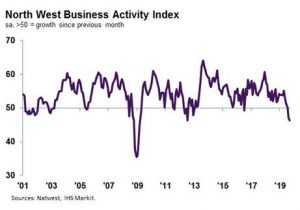Sharpest fall in new orders since February 2009

The latest NatWest PMI (purchasing managers’ index) report signalled a disappointing end to the third quarter of the year, with declines in output and new orders accelerating.
Reflecting this, companies in the North West lowered staffing levels for the first time in 17 months and business confidence fell.
Meanwhile, input costs continued to rise at a marked pace, but the rate of output price inflation slowed and was only marginal.
The headline NatWest North West Business Activity Index – a seasonally adjusted index that measures the change in the combined output of the region’s manufacturing and service sectors – dropped to 46.4 in September, down from 47.1 in August.
This marked the second successive decline in private-sector output in the region, and the sharpest since July 2012.
In fact, the North West posted the second-fastest reduction in output of the 12 UK regions covered, behind only Northern Ireland.
Respondents indicated signs of weakness in client demand, which fed through to lower business activity. Sector data suggested that the overall reduction was centred on manufacturers.
The aforementioned weakness in client demand was shown by a marked reduction in new business as Brexit uncertainty made customers reluctant to commit to new projects.
New orders fell for the fifth month running, and to the greatest extent since February 2009.
As was the case with activity, the North West was one of the worst-performing regions in terms of new business.
With new orders falling, companies were able to work through outstanding business. As a result, backlogs of work decreased, with the rate of depletion the sharpest in 44 months.
Employment declined for the first time in almost a year-and-a-half during September. Anecdotal evidence suggested that companies were reluctant to take on extra staff in a deteriorating demand environment.
Input prices continued to rise at a marked pace in September, albeit one that was softer than that seen in the previous month and weaker than the UK average. Respondents indicated that currency weakness had acted to push up the cost of imported materials.
Despite a further sharp increase in input costs, weak demand meant that firms raised their selling prices only marginally. In fact, the latest increase in charges was the slowest in the current 43-month sequence of inflation.
Business confidence dropped to the lowest since the end of 2012.
While new products and business investment are set to help drive output growth over the coming year, Brexit uncertainty led to a weakening of sentiment in September.
Richard Topliss, chair, NatWest North regional board, said: “The sharpest decline in new orders since the financial crisis highlights the difficulties being faced by firms in the North West at present, with continued uncertainty ahead of the looming Brexit deadline putting off clients.
“In fact, the region seems to be one of the worst affected across the country, with only the vulnerable Northern Ireland economy seeing sharper reductions in business activity and new orders in September.
“Local firms will, therefore, be hoping that the country’s future direction becomes clearer soon.”








